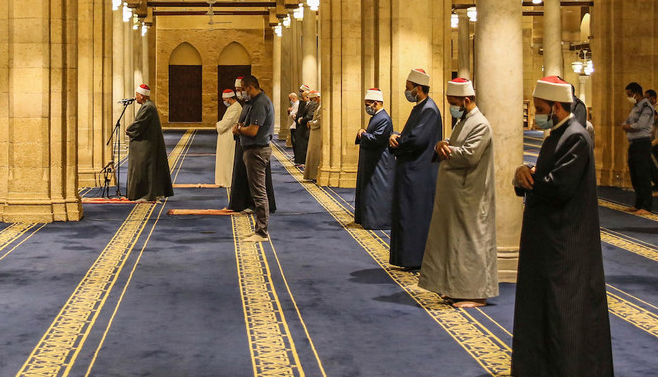CAIRO: Banning children, wearing face masks and closing toilets are some of the rules that Egypt’s mosques must follow during the coronavirus pandemic, as a parliamentary committee on Wednesday discussed plans to welcome back worshippers.
A number of members from the Committee of Religious Affairs and Endowments backed the Ministry of Awqaf’s plan to open mosques on the condition that the Ministry of Health confirmed that the virus no longer posed a threat.
“By opening up all mosques we are contributing to less crowding in mosques, because if we open only a percentage of the mosques in the country, it will increase the number of worshippers who visit them, instead of having them spread throughout the many mosques in the country,” committee secretary Omar Hamroush said. “It is better to have all mosques operating while taking the necessary precautions and preventive measures to prevent the spread of the virus.” He emphasized the need to clean and disinfect mosques after each of the five daily prayers.
Should the Ministry of Health give the green light then mosques, which were sealed off in March in the wake of the outbreak, will accept worshippers but they will be expected to follow regulations announced by the Minister of Religious Endowments Mohamed Mokhtar Gomaa.
They include wearing a protective face mask at all times, keeping a safe distance between rows of worshippers and for each person to have their own prayer mat. Toilets and ablution areas will be closed and there will be a limit to the amount of time spent in the mosque. Children will not be allowed in.
The Ministry of Awqaf’s plan also includes a system for arranging worshippers. There is to be a minimum of 1.5 meters between each person and the same distance between each row of people.
Committee undersecretary, Shoukry El-Gendy, supported the ministry’s plans for reopening mosques and smaller places of worship – zawiyas – and the proposed precautionary measures. But he added that much depended on the congregations themselves.
“We are counting on the cooperation of worshippers and mosque goers,” he said.
He added that people’s concerns about crowding would be allayed as they could go to mosque in shifts rather than everyone heading there at the same time.
The decision to open mosques has not yet been broached by the Egyptian government as discussions have been limited to the ministry and parliament. Some fear that opening mosques too soon may contribute to the spread of the virus.
Dr. Abdel-Samie Ahmed, who has been working in a quarantine hospital, told Arab News that any decision to open up mosques must be studied carefully according to instructions issued by the Ministry of Health and the World Health Organization, taking into account the increasing number of coronavirus cases in Egypt during the past few days.
As of Wednesday, the virus had killed 1,052 and infected 27,536.
Ahmed said that if mosques were open then zawiyas must be excluded from the decision, especially because of their limited space and a lack of proper ventilation.

NO CHILDREN, NO TOILETS: EGYPT SETS OUT MOSQUE REOPENING RULES
No children, no toilets: Egypt sets out mosque reopening rules
SOURCE: https://www.arabnews.com/node/1684331/middle-east

